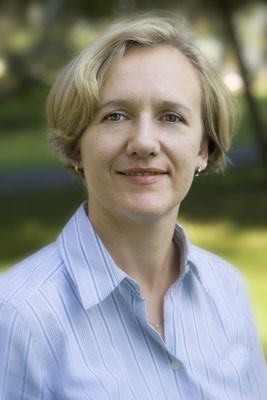Doing right by planet, MBA students do well
The School of Management adds an MBA professional track to teach what environmental sustainability means in the workplace.
Brendon Cussio, MBA ’10, is green but not an activist. Let’s call him an accidental environmentalist – a businessperson who’s doing his part to keep life on Planet Earth livable.
Before getting his graduate degree with an emphasis in finance, Cussio worked for nearly a decade in the financial services industry. He moved on to a leadership role in the renewable energy sector a year and a half ago after a client at Wells Fargo, who was also the CEO of Ventura County-based Solarsilicon Recycling Services (SRS), made him an offer that included an equity stake in the company.
“It’s largely opportunistic,” said Cussio, vice president of marketing and finance at SRS. “This is a great business to be in. It’s growing at a very, very rapid rate. It’s very dynamic. It’s very volatile. It’s exciting.”
It’s also work that Cussio can feel good about. Using proprietary techniques, SRS recycles waste that comes from conventional silicon manufacturers and turns it into feedstock that can be sliced up for use in solar cells and panels that produce electricity, without adding greenhouse gases to the atmosphere. Before SRS and its two international competitors came along, all that waste was destined for landfills.
“So we’re taking, basically, material out of a landfill and turning it into a green, renewable resource,” Cussio explains. Business has been booming because recycling ultimately reduces costs for solar energy producers.
As environmental sustainability becomes a permanent focus of large and small firms, including the great majority of Fortune 500 companies, all sorts of industries will need decision-makers with knowledge of law, engineering, finance, marketing and theory as they relate to green business.
That’s one reason why Cussio, along with other CLU alumni and local businesspeople, has joined forces with management lecturer Valeria Makarova in the effort to build a sustainable business program at CLU.
Makarova, a biophysicist with a Ph.D. in biology who has done fundamental research in renewable energy, earned her own Cal Lutheran MBA in 2008 and stayed on to launch graduate courses in Green Business and Corporate Social Responsibility. She soon began collaborating with faculty and School of Management Dean Chuck Maxey on a program to meet a growing demand in the business community.
MBA students this fall will be able to choose Sustainable Business as a professional track, on a par with other academic emphases from macroeconomics to marketing. Graduates might take up internships and later work at green businesses in this region, or they could lead efforts at startups and established firms to build a competitive advantage on social and environmental responsibility.
“The business community realizes this is not just about being good,” Makarova said. “It’s a big challenge how to show return on investment for sustainable initiatives, but speaking long-term, it makes perfect sense from the standpoint of brand value and customer loyalty. And as regulations become stricter and stricter, you’re on the safe side if you’re at least a little bit ahead.”
A native of Russia who has worked in Germany and Korea and at the National Renewable Energy Laboratory in Golden, Colo., Makarova has a global perspective on environmental challenges. Her personal mission, however, has less to do with resolving international disputes than with “bridging the gap between academia and industry.”
The experience in Colorado working on biohydrogen production, she says, “was a turning point in my life. In that laboratory environment, we also had people addressing what we did in business terms. And I thought, ‘Okay, I need to learn how to do that.’”
In recent years, as interest in sustainable business has grown “exponentially,” Makarova said, the working definition of the idea has changed. Managers and academics alike now speak of a “triple bottom line” used to evaluate a company’s performance in social, environmental and financial terms.
The approach has had an impact worldwide, including among graduates of CLU’s full-time MBA program for international students. Having completed two of Makarova’s courses, for example, Jefferson Matsuda, MBA ’11, returned to Maringá, Brazil, with a new vision for his family’s trucking company, which transports liquid cargo around southern Brazil.
Matsuda said he got support from his uncle and his father, the CEO and CFO of Rodoviário Matsuda, on two ideas that he came up with during the CLU courses: a sustainable new headquarters and company meetings conducted by teleconference.
“Besides reducing utilities costs, the building can also promote a better environment for the workers and increase productivity,” with improved air quality and extensive use of natural light, writes Matsuda in an email.
With Matsuda on the Quality and Security Management Team, the company also has new training and speed control programs to reduce accidents involving its 200 vehicles, which often carry hazardous materials. He reports that it has begun an extensive recycling program and says that it is addressing carbon emissions with a low average fleet age, good maintenance and regular smog tests.
Such measures all could be considered baby steps, given the magnitude of global warming, the loss of biodiversity worldwide and other serious ecological challenges. Calling herself a realist, Makarova said that dissent and critique from environmentalists have been very important, but that corporations will play a more decisive role in our future.
“We really think that this is a time to do something about [the environment], not just talk about it,” said Makarova. “But who will do that?”
